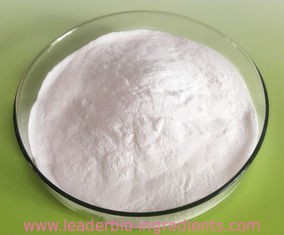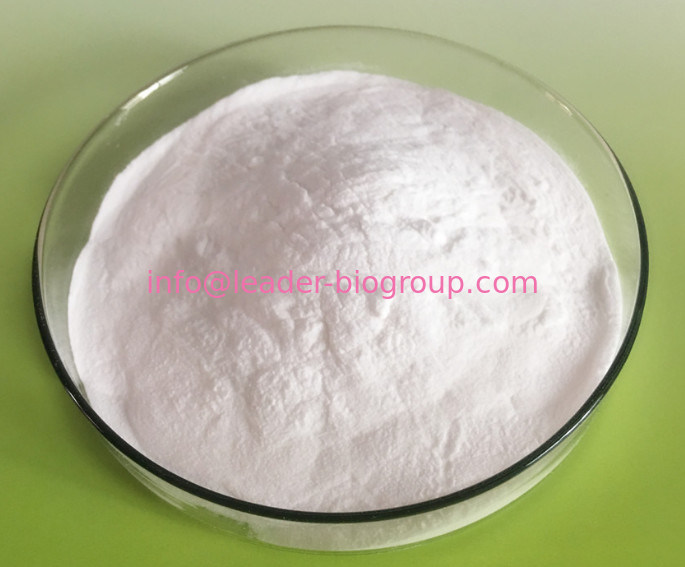
China Northwest Factory Manufacturer n-Docosanol / Behenyl Alcohol / 1-Docosanol CAS 661-19-8 For stock delivery
-
Purity99.9%
-
UseHealth Care
-
OriginChina
-
Package1KG/Tin 25KG/Drum*Carton
-
ManufacturerXI'AN LEADER BIOCHEMICAL ENGINEERING CO.,LTD
-
Place of OriginCHINA
-
Brand NameLeader
-
CertificationISO,GMP,SGS,HALA,KOSER,HACCP
-
Model NumberLD
-
Minimum Order Quantity25KGS
-
PriceNegotiate Depend on order quantity
-
Packaging Details25KG/Drum
-
Delivery Time2-3 working days
-
Payment TermsWestern Union, MoneyGram, T/T, L/C
-
Supply Ability10MTS/Month
China Northwest Factory Manufacturer n-Docosanol / Behenyl Alcohol / 1-Docosanol CAS 661-19-8 For stock delivery
| n-Docosanol Basic information |
| Product Name: | n-Docosanol |
| Synonyms: | ALCOHOL C22;BEHENYLIC ALCOHOL;Behenic alcohol;behenicalcohol;Cachalot BE-22;Dehydag wax 22 (lanette);Docosan-1-ol;Docosanol-(1) |
| CAS: | 661-19-8 |
| MF: | C22H46O |
| MW: | 326.6 |
| EINECS: | 211-546-6 |
| Product Categories: | ABREVA;Pharmaceutical Raw Materials;Saturated Higher Alcohols;1-Alkanols;Antivirals for Research and Experimental Use;Biochemistry;Higher Fatty Acids & Higher Alcohols;Monofunctional & alpha,omega-Bifunctional Alkanes;Monofunctional Alkanes;Pharma material;fine chemicals;Inhibitors |
| Mol File: | 661-19-8.mol |
| n-Docosanol Chemical Properties |
| Melting point | 65-72 °C(lit.) |
| Boiling point | 180 °C0.22 mm Hg(lit.) |
| density | d75 0.8063 g/ml; d85 0.7986 g/ml; d95 0.7911 g/ml |
| refractive index | n75 1.4360 |
| storage temp. | 2-8°C |
| pka | 15.20±0.10(Predicted) |
| form | Pellets or Tablets |
| color | White |
| Water Solubility | Insoluble |
| Merck | 13,3433 |
| BRN | 1770470 |
| Stability: | Stable. Combustible. Incompatible with strong oxidizing agents. |
| CAS DataBase Reference | 661-19-8(CAS DataBase Reference) |
| NIST Chemistry Reference | 1-Docosanol(661-19-8) |
| EPA Substance Registry System | 1-Docosanol (661-19-8) |
| Safety Information |
| Safety Statements | 24/25 |
| WGK Germany | - |
| RTECS | JR1315000 |
| TSCA | Yes |
| HS Code | 29051900 |
| Hazardous Substances Data | 661-19-8(Hazardous Substances Data) |
| Toxicity | LD50 intraperitoneal in mouse: > 800mg/kg |
| MSDS Information |
| Provider | Language |
|---|---|
| 1-Docosanol | English |
| ACROS | English |
| SigmaAldrich | English |
| ALFA | English |
| n-Docosanol Usage And Synthesis |
| Chemical Properties | 1-DOCOSANOL is white powder |
| Uses | antiviral |
| Uses | n-Docosanol is a binder and an emulsion stabilizer. It is also used to increase a formulation’s viscosity. This is a mixture of fatty alcohols. behenyl alcohol may be used for any number of purposes in a cosmetic formulation, including as an emollient, a binder, an emulsion stabilizer, or to increase a product’s viscosity. It may be derived either synthetically or from plants. |
| Definition | 1-DOCOSANOL is a long-chain, saturated fatty alcohol. |
| Indications | Docosanol (Abreva) is a long-chain saturated alcohol that is clinically effective against HSV. It has in vitro activity against many enveloped viruses, including CMV, influenzavirus, and respiratory syncytial virus. Docosanol is not directly virucidal; instead, it blocks the entry of the virion into the host cell by inhibiting the fusion of the viral envelope with the host plasma membrane. Because it does not affect viral replication or protein production, it may be less susceptible to the development of resistance than other antiviral drugs. |
| Pharmaceutical Applications | 1-DOCOSANOL is a 22-carbon straight chain alcohol licensed for over-thecounter sales for the topical treatment of herpes labialis. It is thought to act by blocking viral fusion with the host cell, although definitive studies are lacking. The clinical relevance of the antiviral activity has been debated and the place of this medication as a treatment of herpes labialis remains to be established. |
| Clinical Use | Docosanol cream is approved for the over-the-counter treatment of herpes labialis. It shortens the duration of symptoms of cold sores and fever blisters but does not provide symptomatic relief. |
| Side effects | Adverse effects of docosanol are minimal. Skin irritation occurs infrequently. Drug interactions are not anticipated. |
| Purification Methods | Crystallise docosanol from r or chloroform/r. [Beilstein 1 IV 1906.] |
| n-Docosanol Preparation Products And Raw materials |
| Preparation Products | N-TETRATETRACONTANE |
